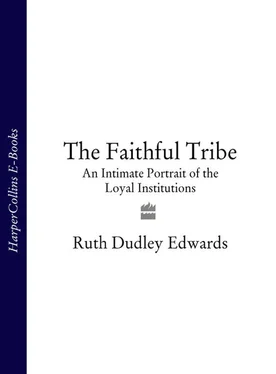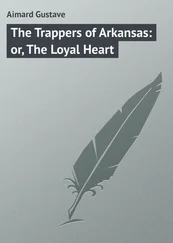I left my Orange friends in Portadown, noting as I looked back that there was an Ulster flag flying from a flagpole above my bedroom window. As I drove along the excellent roads fretting about Drumcree I got depressed once again about how deceptively tranquil is the countryside and how awful the sufferings of many of its inhabitants. You come out of Armagh into the Clogher Valley and thence to Fermanagh of the lakes and everywhere is lovely and well-tended and apparently peaceful; the fields are neat and the cattle sleek and the adolescent lambs are gambolling, yet road signs throw up reminders of atrocity after atrocity and latterly, reflecting my new preoccupations, of lower-level inter-communal cruelties and sectarian strife and the burning of Orange halls and the vandalizing of Catholic churches and the boycotting of decent shopkeepers from both tribes.
Then I knew I was in Donegal, for the roads had, in truth, suddenly become very bad. Seeing from a sign that my destination was, however, only 8 kilometres away, I thought Graham had been making rather a fuss, but then I got caught behind a bus with a shamrock on the back which crawled all the way to Rossnowlagh; it turned out to be a shuttle-bus for transporting fragile Orangepeople around the place.
Rossnowlagh farmers are happy annually to make a few bob out of this incursion from the North so there was no shortage of paying car parks. It was a sunny day, I wandered back to the assembly point and watched out for the people I was supposed to be linking up with, but inevitably I’d forgotten half the relevant details, like the number of their lodge, and was confined to wandering about the place asking people if they knew a big man with a moustache who came from Cavan. But then another coach drew up at the assembly point and out of it emerged the friendly face of the Grand Master, Bobby Saulters.
Bobby Saulters is sunny-natured, humorous and fatalistic, which in his difficult position is just as well. He is also without self-importance. As he stood there clutching his bowler hat and beaming at people, he was ribbed about something he had said on television that had annoyed the Orange hard-line pressure group known as the Spirit of Drumcree. ‘Ach,’ said Bobby, laughing, ‘you should have heard what was on my answering machine when I got home.’
Like all Orangemen of my acquaintance, Saulters cannot see you without worrying that you might be hungry. Having established that, unlike the brethren in the coaches, I had not stopped for refreshment along the way, he said we must go to the meeting hall for tea. We wandered up and joined a queue of Orangemen and their families: there was no VIP line, no notion in anyone’s mind, let alone his, that the Grand Master deserved any special attention other than a warm welcome for having come all the way from Belfast.
By now a veteran of church and Orange and village halls and refreshment tents in fields, I marvelled with Saulters that we were given proper crockery. Here catering was not left just to the ladies: a clergyman was in charge of selling sandwiches and a layman in charge of the teapots. The whole event was very much a community effort by local Protestants. I had a sandwich and refused cake, but Saulters was so worried that I might faint from hunger on the parade that eventually he persuaded me to parcel up a cake in a napkin and put it in my bag for later. I ate it in the afternoon sitting on the grass during the service.
There seemed to be far more women than usual in the Rossnowlagh parade. I studied their clothes for a while. There was a wide variation in the dress code probably reflecting differences between rural and urban and middle-class and working-class backgrounds. One lodge had everyone dressed identically, regardless of what suited their colouring or size, in another everyone wore a suit and hat of the same colour but in different styles, another permitted skirts of any colour but all jackets were black and there was one in which they wore their best outfits, which were all different.
I ambled along with the parade in company with Gerry, an Irish journalist (I think we were the only media representatives there). We enjoyed the sunshine and the walk and the music and talking politics and people. When we reached the little seaside town, it proved to be unpretentious and unspoiled. There were the usual stalls selling fast food, books and souvenirs. Most people settled down by the sea or in the field and ate their own picnics.
The hotel was full up, crammed with feeding dignitaries or Orangepeople who had pre-booked – the usual number swollen by the presence of some members of the Imperial Grand Council – but my companion and I got into the bar because we were journalists. The manager depressed us by telling us that for the first time ever, they had no guests staying this year because of the parade. They had never had any problems at Rossnowlagh; there never had been any tension and it had always been seen as a day for both communities. But Drumcree Two had changed the climate and people were frightened.
Having looked at the more interesting stalls we settled down in the field waiting for the usual problems of whistling microphones and missing speakers to be resolved by the hosts. I recorded some of the speeches. Most memorable was the thoughtful address by Dr Warren Porter, Presbyterian clergyman and an Assistant Grand Master of the Orange. It was no accident that he chose as the text on which to preach these verses from 1 Peter 2:
Dearly beloved, I beseech you as strangers and pilgrims, abstain from fleshly lusts, which war against the soul.
Having your conversation honest amongst the Gentiles: that, whereas they speak against you as evildoers, they may by your good works, which they shall behold, glorify God in the day of visitation.
Submit yourselves to every ordinance of man for the Lord’s sake: whether it be to the king, as supreme;
Or unto governors, as unto them that are sent by him for the punishment of evildoers, and for the praise of them that do well.
For so is the will of God, that with well doing ye may put to silence the ignorance of foolish men:
As free, and not using your liberty for a cloak of maliciousness, but as the servants of God.
Honour all men. Love the brotherhood. Fear God. Honour the king.
Servants, be subject to your masters with all fear; not only to the good and gentle, but also to the froward.
For this is thankworthy, if a man for conscience toward God endure grief, suffering wrongfully.
For what glory is it, if, when ye be buffeted for your faults, ye shall take it patiently? but if, when ye do well, and suffer for it, ye take it patiently, this is acceptable with God.
The message could not have been plainer, and it was echoed by other platform speakers who implicitly or explicitly urged restraint. Here are a few extracts from speeches which – apart from coded messages about Drumcree – are typical of how Orangemen greet each other from platforms.
Right Worshipful County Grand Master, Most Worshipful Imperial Grand Master, Most Worshipful Brother Saulters, County and District Officers, brethren, sisters, ladies and gentlemen, it’s my pleasure and privilege to have the distinct honour indeed to be here today at such an excellent gathering. As I look out across this wonderful crowd, the colourful display, the respect, the dignity and the discipline that we’ve just shown, it typifies what many Orange gatherings are about and that they do no harm to anybody whatsoever … I would like bring to the members of Donegal County Grand Orange Lodge fraternal greetings from the County Fermanagh Grand Orange Lodge. It is a pleasure indeed and a privilege to represent County Fermanagh here this afternoon and I look forward to welcoming those of you who can come next Saturday to County Fermanagh to our demonstration there.
Читать дальше












